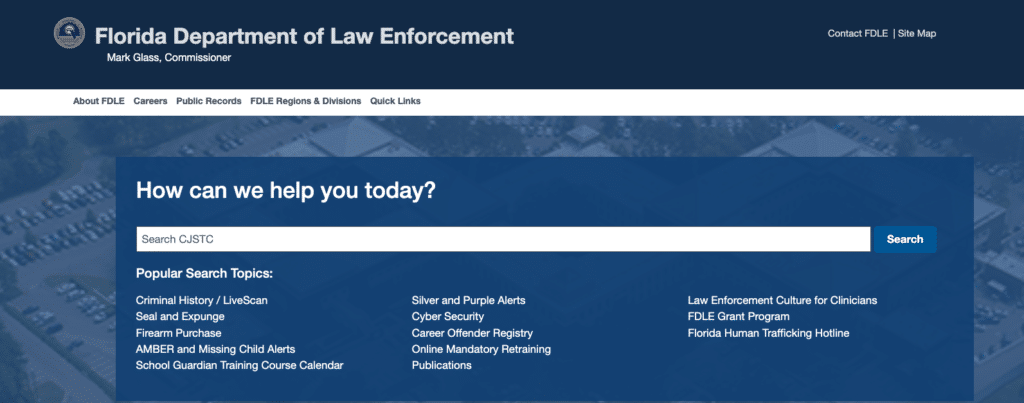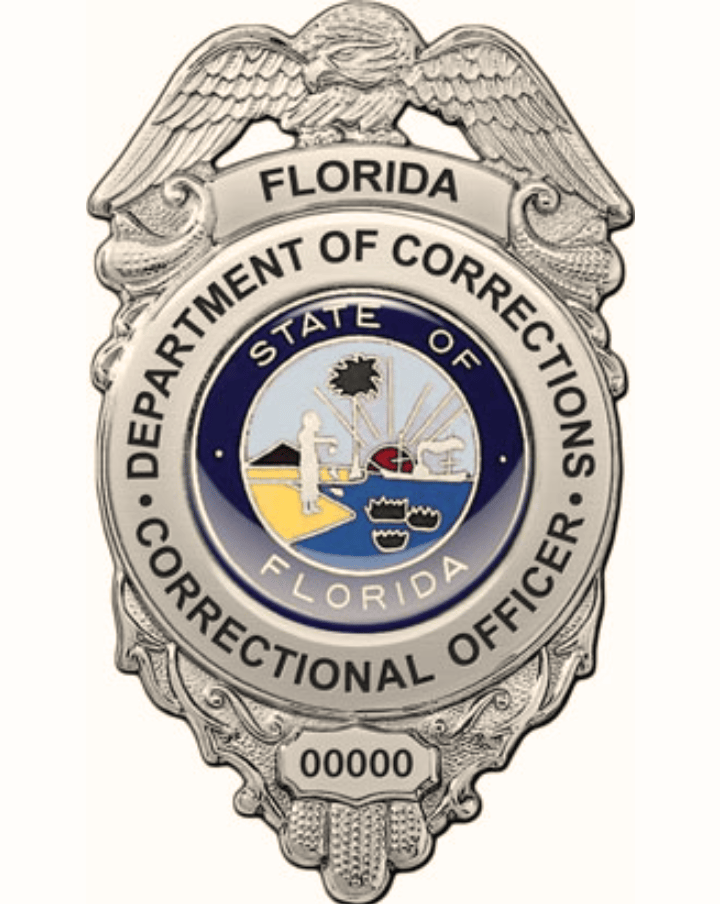Contents
- 1 What is the Florida Department of Law Enforcement or FDLE?
- 2 What categories of criminal records are included in the FDLE Warrant?
- 3 How does the FDLE process work for obtaining criminal records?
- 4 How long does receiving criminal records through FDLE take?
- 5 What is the cost of accessing criminal records through FDLE?
- 6 Is the information available via FDLE current and accurate?
- 7 Can FDLE criminal records be used for employment
- 8 What information is needed to access criminal records via FDLE?
- 9 Does FDLE provide access to criminal records from different states or countries?
What is the Florida Department of Law Enforcement or FDLE?
Down in Florida, the Florida Department of Law Enforcement (FDLE) stands tall as the main agency handling criminal justice. They back up law enforcement all over the state, digging into crimes and doing forensic tests. The FDLE keeps the Florida Criminal History Information database packed with criminal records, fingerprints, and more. They work hard to keep everyone safe and secure, from locals to visitors. Partnering with state and federal agents, they aim high in their mission.
What categories of criminal records are included in the FDLE Warrant?
The FDLE Warrant Search by name provides access to various types of criminal records, including:
Access to these documents may be restricted and dependent on meeting certain criteria to qualify. The Florida Department of Law Enforcement (FDLE) provides this information as a public service, but they do not guarantee or represent that it is accurate or comprehensive in any way.
How does the FDLE process work for obtaining criminal records?
The process for obtaining criminal records through FDLE Warrant Search is as follows:

How long does receiving criminal records through FDLE take?
These timelines don’t include mailing times. FDLE (Florida Department of Law Enforcement) is not responsible for that part, and anyone who’s ever waited on bureaucratic mail knows it can feel like waiting for a glacier to move.
The Background Screening Unit
There’s an added layer if your background check goes through the Background Screening Unit. This process takes, on average, another 5 to 7 business days. And remember, this starts after the FDLE results come in. It’s the kind of thing that forces you to plan ahead, because speed is not the hallmark of these systems.
A Quicker Option?
For those in a hurry, there is an online option: the “Instant Search.” This is a modern convenience allowing immediate access to non-certified records, with results ready to be printed or emailed. While incredibly useful for those needing quick information, it’s important to note that these results, while fast, aren’t certified.
For those who need to dig a little deeper, some local law enforcement agencies have their own warrant search features. These often provide instant access, particularly for basic searches. If you need immediate answers, local agencies may be the fastest option.
What is the cost of accessing criminal records through FDLE?
- The Florida Department of Law Enforcement (FDLE) provides a free online searchable database for active warrants in Florida. This search can be done through the Florida Criminal Information Center (FCIC) Public Records Search Page.
- For more comprehensive criminal history records, the fee for public requests is $24 per search.
- There is an additional $1.00 credit card processing fee for online searches.
- The FDLE does not offer waivers for the processing fee.
- For certain qualified entities providing care to children, elderly, or disabled persons, there is a reduced fee of $18 for volunteer background checks through the Volunteer and Employee Criminal History System (VECHS).
- Local law enforcement agencies may have their own warrant search features that are typically free to use.
- While the FDLE warrant search is free, obtaining certified copies or more detailed records may incur additional fees. For example, certified copies cost $1.00 per certification.
Is the information available via FDLE current and accurate?
- The FDLE Warrant Search database contains information on active warrants reported by law enforcement agencies throughout Florida. However, not all outstanding warrants are immediately listed in this database.
- The information in the FDLE’s searchable database is updated every 24 hours. This means there can be a short delay between when a warrant is issued and when it appears in the system.
- FDLE and reporting agencies strongly recommend that no citizen take any individual action based solely on this information. The database information should not be relied upon for legal action or as probable cause for an arrest.
- Wanted persons may use false identification, which could cause the warrant to contain inaccurate information. The physical characteristics of an individual may also differ from those returned by a query to the site due to intentional changes or the passage of time.
- The absence of information in an entry (such as scars, marks, tattoos) does not necessarily mean the person doesn’t have these features – it may just mean the contributing agency was not aware of them.
- For the most up-to-date and accurate information, it’s recommended to verify that a warrant is active with the local law enforcement agency or the FDLE.
- Some law enforcement agencies may deliberately keep warrants out of public databases to avoid tipping off suspects.
Can FDLE criminal records be used for employment
The Visibility of Criminal Records in Florida: A Double-Edged Sword
In Florida, criminal records are largely a matter of public access—unless they’ve been sealed or expunged. This openness makes it easy for employers, landlords, and even nosy neighbors to dig into your past. It’s an unsettling reminder of how one’s mistakes, or mere brushes with the legal system, can follow you indefinitely, shaping opportunities in deeply unjust ways.
The FDLE’s Background Check Options
Florida’s Department of Law Enforcement (FDLE) offers two primary types of background checks:
- Level 1 checks: These are limited to state records and are based solely on name. It’s a less invasive peek into someone’s history, but still significant in its impact.
- Level 2 checks: These go further, involving fingerprinting and a sweep of FBI data. It’s a deeper dive into one’s past, with federal records coming into play.
The fact that these background checks are so accessible forces us to confront the uncomfortable truth of our justice system—a system that rarely allows for true redemption or privacy. What does it mean to move forward when your past is always in plain view?
What information is needed to access criminal records via FDLE?
To obtain criminal records through FDLE Warrant Search, you will typically need to provide certain identifying information, such as:
Name: You must supply the complete name of the person whose criminal history records you are requesting.
Date of birth: To complete your request, you will need to enter the date of birth of the person whose criminal records you are requesting.
Other identifying information: Depending on the type of record you request, you may also need to provide additional identifying information, such as a Social Security number, driver’s license number, or fingerprints.
Please provide accurate and complete identifying information to ensure that you receive the correct criminal records and to help protect against unauthorized access and disclosure of sensitive information.
Does FDLE provide access to criminal records from different states or countries?
The FDLE Warrant Search is limited to Florida criminal records only and does not provide access to criminal records from other states or countries.
- The FDLE’s Computerized Criminal History (CCH) files only include Florida criminal records. Neither other states’ criminal records nor federal criminal records are available from the FDLE.
- The FDLE maintains a state-level database of information on criminal activity within Florida, which is shared with state and national level criminal justice agencies.
- For international background checks, separate processes are required. These can take anywhere from 2-30 days depending on the country and are not part of the standard FDLE search.
- When broader searches are needed, other resources like federal databases or PACER may need to be used for out-of-state or federal records.

